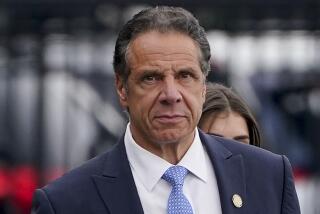Meese Scored in Internal Report by Justice Dept.
- Share via
WASHINGTON — An internal Justice Department report on former Atty. Gen. Edwin Meese III concludes that he engaged in “conduct which should not be tolerated of any government employee, especially not the attorney general,” and that disciplinary action by the President would be warranted if Meese was still in office.
The strongly worded 61-page report, a copy of which was obtained by the Washington Post, pointedly contradicts assertions by Meese in July that he had been “completely vindicated” by the decision of independent counsel James C. McKay not to seek an indictment against him. McKay found that Meese had probably violated federal conflict-of-interest and tax laws, but said prosecution was not appropriate.
Numerous Violations Found
The Justice Department’s Office of Professional Responsibility found that Meese, who left office in August, had committed numerous violations of departmental regulations and a 1965 executive order setting out ethical standards for government employees. Its report cites Meese’s relationship with San Francisco lawyer E. Robert Wallach; his handling of telecommunications matters at a time he owned stock in regional telephone companies and his failure to pay full taxes on time.
“We trust that this analysis will lay to rest the claims by Mr. Meese that the appropriate standard for official behavior is whether an independent counsel seeks an official’s indictment,” said the report, which is expected to be released today. “We found that the independent counsel’s report far from vindicates Mr. Meese; rather, it details conduct which should not be tolerated of any government employee, especially not the attorney general of the United States.”
The report concludes that if Meese was still attorney general, “we would recommend (to the next ranking department official) that the President take disciplinary action.” It does not specify what action would be appropriate.
In a 16-page statement to be released in response to the report, Meese’s lawyers contend that “there is absolutely no basis for criticizing his conduct” and term the report “a travesty of justice.”
The Office of Professional Responsibility is an arm of the Justice Department charged with investigating allegations of wrongdoing by department employees. Its inquiry was launched in July, after McKay concluded his investigation. Although office head Michael E. Shaheen Jr. submitted the report to Atty. Gen. Dick Thornburgh on Oct. 28, its release was delayed while Thornburgh and other department officials reviewed it.
Significance of Report
Although the study adds few new facts to McKay’s 830-page report, it is significant because McKay did not address the question of whether Meese’s conduct violated ethical rules and because it represents a finding by Meese’s own department that his conduct was improper.
The report focuses on Meese’s dealings with Wallach, his close friend since they attended law school together. Wallach enlisted Meese’s help on behalf of clients, notably the now-defunct Wedtech Corp. and Swiss financier Bruce Rappaport, who was promoting a project to build an Iraqi oil pipeline.
Although the report says that “serving as a federal official does not necessitate the dissolution of all friendships,” it notes that the 1965 executive order requires government employees to refrain from activities that would cause citizens to lose confidence in governmental integrity.
Three Instances Detailed
“Based upon the facts that are available, we must conclude that Mr. Meese, in certain instances involving Mr. Wallach, either did not understand, or did not appreciate, or simply did not care what impression could be left with the public about his own integrity and the integrity of those functions he oversaw,” it says.
The report details three instances “in which friendship dictated government action,” including Meese’s actions, while White House counselor, to help Wedtech obtain an Army engine contract, as well as a loan subordination agreement from the Department of Commerce; and his later role, as attorney general, in helping Wallach promote the pipeline project.
Meese’s “intercession on behalf of Wedtech by directing or permitting his staff at the White House to pursue the private interest of Wedtech . . . cannot, viewed objectively, pass muster” under government ethical standards requiring employees to avoid any actions which “create the appearance of using public office for private gain” or “giving preferential treatment to any organization or person,” the report says.
Meese has contended that he did nothing more than make certain that Wedtech was “treated fairly” by the Army and that he never directly intervened on the company’s behalf.
The report also criticizes Meese’s actions when he was lobbied by former White House aide Lyn Nofziger on behalf of Wedtech and the Latin American Manufacturers Assn., saying that Meese should have known that Nofziger was restricted from lobbying him by federal ethics laws and “should have rebuffed contact.”
More to Read
Get the L.A. Times Politics newsletter
Deeply reported insights into legislation, politics and policy from Sacramento, Washington and beyond. In your inbox twice per week.
You may occasionally receive promotional content from the Los Angeles Times.









